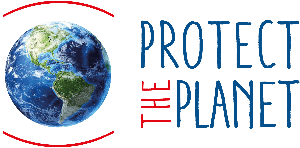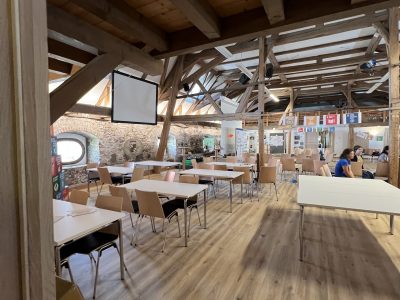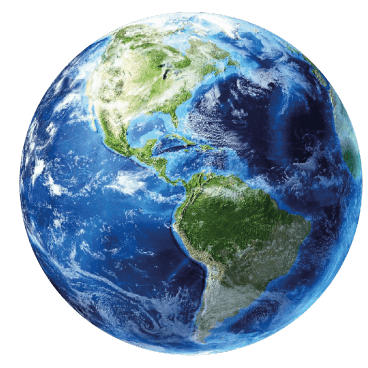The first European climate case
The real repercussions of climate change are already tangible – from Fiji to Langeoog. Ten families from Europe and from developing and emerging nations, who are all affected by the climate crisis, took their case to the Court of the European Union in 2018. They claimed the EU climate goals for 2030 were insufficient to avert the dangerous consequences of climate change, and therefore violated the basic human rights of the plaintiffs.
“Those responsible for the climate crisis should really be taken to court”, said Dorothea Sick-Thies in the year 2016 – the first impulse to file a court case at the European level.
The climate case focused on the inadequate climate goals of the EU and insufficient directives for their implementation. The plaintiffs sought climate goals that would protect them, since climate change was already causing damage to their homes and livelihoods, which would only worsen in the future. It was about their basic human right to life and health, the wellbeing of their children, their property and their freedom to earn a living. The plaintiffs were all threatened by such climate change consequences as lack of water, flooding, receding ice and snow, drought and heat waves.
The European Parliament and Council had resolved to reduce the threshold for greenhouse gas emissions by 2030 compared to 1990 by 40 %.
However that would allow the continued emission of 60 % of greenhouse gases – with increasingly devastating impacts on humankind and the environment. Given the necessity to prevent further damage from the ongoing threat of climate change, that is unacceptable.
People from all kinds of different countries and cultures came before the court in the People’s Climate Case. Sanna, Giorgio, Maurice, Geneviève, Ildebrando, Alfredo, Armando, Dima, Roba, Maike and Lelo have already been affected by climate change and they pleaded for the basic human right to earn a living, as well as for the inviolability of property, health and freedom of personal development.
The court heard about spring temperatures in February experienced by Saami north of the Arctic Circle, dying coral around the islands of Fiji, shrivelled-up lavender plantations in Provence and the threatened freshwater lens of the East Frisian island of Langeoog. Scientific evidence provided by Climate Analytics confirmed the personal impressions of those affected and showed how real the crisis already is. The economic, health and cultural impacts were not only real, but tangible and measurable.
- The Recktenwald family on Langeoog runs a bio-hotel with a restaurant. The rise in the water table, storm flooding and resultant erosion of the sand dunes all threaten the freshwater supply of this North German island.
- The lavender-farming Feschet family from Montelimar in the Provence is struggling with heat waves, a 0.5 °C temperature increase per decade and unpredictable rainfall fluctuations.
- The Sendim and Caixeiro families run a cooperative farm near Èvora in Southern Portugal. A 2 °C rise in temperature is turning the land into a desert area, with rainfall decreasing by about 10 % per year.
- The beekeeping Conceição family in Tomar, Portugal is concerned about the threat to the population and productivity of their beehives. Extreme weather events, such as 30 °C in November and heatwaves of over 40 °C are no longer a rarity.
- The Carvalho family farms a forest in Santa Comba Dão, Portugal. Extreme drought and, for the first time ever, six months with no rain at all, led to a total loss of their plantations in 2017 due to forest fires. Increasingly, these are becoming an everyday event in Portugal.
- Extreme heatwaves are threatening the water supply of the Guyo family from Badan Rero in Kenya. The rainy season is become increasingly brief, and the rare instances of any rainfall increasingly torrential. Remote water reservoirs are making life very difficult for this family.
- The Romanian Vlad family from Călene runs a subsistence farm and breeds sheep. Rising temperatures, drought and lack of water are threatening their ability to earn a productive living. The Carpathians are facing an average rise in temperature of up to 4° C.
- The Elter family from Cogne in the Italian Alps runs a hostel and a working farm. Rising temperatures, shifting seasons and lack of rainfall are leading to a decrease in their annual earning capacity of up to 30 %.
- The Qaloibau family on Vanua Levu in Fiji makes a living from farming and tourism. Repeated cyclones and the rising sea level put the family at risk of having to completely relocate by 2100. Coral reefs in the region are also dying off.
- Young people of the indigenous Sáminuorra race in Northern Sweden are facing the demise of their traditional reindeer husbandry and, as a result, their entire Sámi culture. Higher temperatures have led to a significant reduction in the amount of inhabitable living space for reindeer in this region.
The three contested EU directives on emissions trading, burden sharing and land use were deemed completely inadequate from a climate policy perspective and violated the basic human rights of those affected. The European Parliament and Council – acutely aware of the issue in the wake of protests and this court case – had raised their EU climate goal for 2020 to 55 %. But the court decided differently. On 25 March 2021, the claim was denied by the European Court, due to “lack of exclusive applicability”. A particular feature of the European ruling is that complaints brought before this court are not admissible if more than one “individual is personally affected” – a logic that is at odds with many people’s sense of justice.
But even though the ruling of the court did not fall in the plaintiffs’ favour, this court case paved the way for the historic decision of the German Constitutional Court on the Constitutional Complaint against the Climate Protection Act of the German Federal Government, which we also supported.
Protect the Planet, in conjunction with law professor Dr Gerd Winter from Bremen University, Germanwatch e.V. and renowned environmental lawyer Dr Roda Verheyen, made this European climate case possible. Together with partner organisations from the Climate Action Network Europe (CAN-E), ZERO – Associação Sistema Terrestre Sustentável (Portugal), 2celsius (Romania), Notre-Affair-à-Tous (France) and Øko- logiske Råd (Denmark) a European network of climate and environmental organisations was founded to support the plaintiffs. This allowed ten families and a Swedish youth group already directly affected by the climate crisis to file a case with the EU Court on 23 May 2018.
Videos on the People’s Climate Case

Mit dem Laden des Videos akzeptieren Sie die Datenschutzerklärung von YouTube.
Mehr erfahren
Introduction to the People’s Climate Case

Mit dem Laden des Videos akzeptieren Sie die Datenschutzerklärung von YouTube.
Mehr erfahren
Maurice Feschet From France

Mit dem Laden des Videos akzeptieren Sie die Datenschutzerklärung von YouTube.
Mehr erfahren
Alfredo Sendin from Portugal

Mit dem Laden des Videos akzeptieren Sie die Datenschutzerklärung von YouTube.
Mehr erfahren
Ildebrando Conceição from Portugal

Mit dem Laden des Videos akzeptieren Sie die Datenschutzerklärung von YouTube.
Mehr erfahren
Armando Carvalho from Portugal

Mit dem Laden des Videos akzeptieren Sie die Datenschutzerklärung von YouTube.
Mehr erfahren
Giorgio Elter from Italy

Mit dem Laden des Videos akzeptieren Sie die Datenschutzerklärung von YouTube.
Mehr erfahren
Petru Vlad from Romania

Mit dem Laden des Videos akzeptieren Sie die Datenschutzerklärung von YouTube.
Mehr erfahren
Recktenwald family from Germany

Mit dem Laden des Videos akzeptieren Sie die Datenschutzerklärung von YouTube.
Mehr erfahren
Sáminuorra youth group from Sweden

Mit dem Laden des Videos akzeptieren Sie die Datenschutzerklärung von YouTube.
Mehr erfahren
Guyo family from Kenya
[German] coverage of the People’s Climate Case
More detailed information:
- The plaintiffs: https://peoplesclimatecase.caneurope.org/de/presse/videos/
- The case: https://peoplesclimatecase.caneurope.org/de/informieren/ & https://peoplesclimatecase.caneurope.org/de/informieren/rechtl-hintergruende/#1552377197623-e89c5111-8225
- The court process (What happened when?): https://peoplesclimatecase.caneurope.org/de/informieren/rechtl-hintergruende/#1552377070063-f11a4e1b-5a72
- The ruling: https://peoplesclimatecase.caneurope.org/de/informieren/rechtl-hintergruende/#1552377070063-f11a4e1b-5a72











